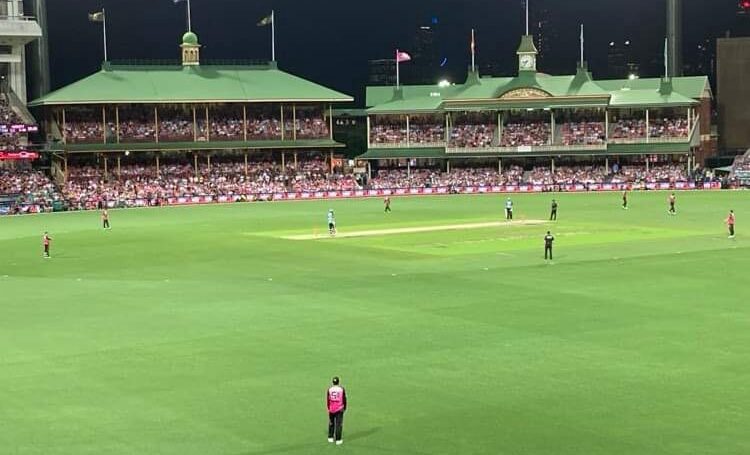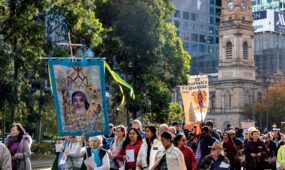Politics of sport
Opinion
As we enjoy the usual summer smorgasbord of sport it might seem frivolous of us Aussies to be so obsessed with our sporting heroes when there is such terrible suffering in other parts of the world.

But it was interesting to hear Pope Francis talk recently about the power of sport to unite people and build bridges. (Certainly the West Indies victory in the third test was a unifying moment for cricket lovers around the world!)
The Pope’s comments came as he addressed Athletica Vaticana, which includes Vatican employees, citizens, priests, Religious and even members of the Swiss Guard who compete in local, national and international competitions.
Advertisement
Pope Francis described sport as “an instrument of inclusion that breaks down barriers and celebrates diversity”.
“This unity in sport is a powerful metaphor for our lives. It reminds us that despite our differences we are all members of the same human family,” he said.
With the summer Olympic Games approaching, Pope Francis said his hope was that “in the particularly dark historical moment we are living” sport can “foster peaceful relations”.
He referred to tradition of the ‘Olympic truce’ which was established in Ancient Greece in the 9th century BC by the signing of a treaty between three kings. During the truce, athletes, their families and ordinary pilgrims could travel safely to participate in or attend the Olympic Games and return afterwards to their respective countries. (Source: Olympics.com)
In 1992 the International Olympic Committee (IOC) decided to revive the ancient concept of the Olympic truce with a view to protecting, as far as possible, the interests of the athletes and sport in general, and to encourage the search for peaceful and diplomatic solutions to the conflicts around the world.
It would be nice, if not somewhat naïve, to think that in the lead up to the Paris Olympics pressure could be brought to bear on the leaders of countries embroiled in conflict both directly and indirectly.
As the war in the Holy Land continues, there is bound to be an impact on athletes planning to compete in the Games, not just in terms of training regimes but also whether Palestinians and Israelis will want to be in the same arena.
This will also be the first summer Olympics since the outbreak of war in Ukraine two years ago. Close to home we have witnessed the impact of this conflict on sport, with a Ukrainian player in the Australian Open refusing to shake the hand of her Belarus opponent, a practice that has become common in international tennis since the Russian invasion. The players’ protest against Russia and its ‘strategic partner’ Belarus is understandable, but is it right to hold every Russian or Belarusian accountable for their country’s actions, and is it a missed opportunity to ‘build bridges’?
The IOC has stated that athletes cannot be held responsible for the actions of their governments and has insisted it will not discriminate against Israeli athletes, prompting accusations of double standards from the Russians, whose athletes were banned from competing under the Russian flag at the Beijing Winter Olympics. The IOC has also ruled that Russian and Belarus athletes who qualify for Paris must compete as ‘neutrals’.
The IOC countered Putin’s claim of hypocrisy by arguing that the ruling was due to Russia’s invasion of Ukraine violating the Olympic truce when it was in place in 2022.
Advertisement
There is sure to be more intense debate about Israel’s participation in the Olympics if their relentless attacks on Gaza continue, however, the issue of antisemitism is an added complication.
The problem with penalising nations and, indirectly, their athletes, is where do you stop? There are plenty of countries waving the flag at the Olympics and other global sporting events despite having a woeful track record when it comes to human rights.
Allegations of sportswashing have been levelled against countries like Saudi Arabia, China and Qatar in recent times and yet we seem to turn a blind eye when there are benefits for us.
Sportswashing, or exploiting sporting events to gain credibility, is nothing new. The most famous example is the 1936 Berlin Olympics which Adolf Hitler used to promote Aryan superiority.
On the other hand, sport has been used as an opportunity to promote good, such as Nelson Mandela turning the Rugby World Cup of 1995 into an opportunity to unite the South African nation.
Memories of the 1972 Munich Olympics when Palestinians took Israeli athletes hostage will be in the minds of IOC officials as they up the ante on security measures.
Let’s hope, and pray, that the Olympic truce will have real impact and that the Paris Games will be a showcase of not only the skill and commitment of competitors but also of fraternity, good will and unity, at a time when the world desperately needs it.







